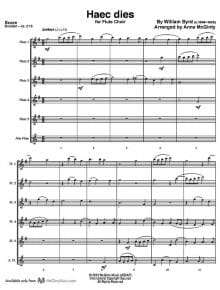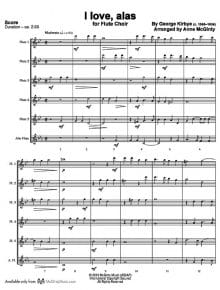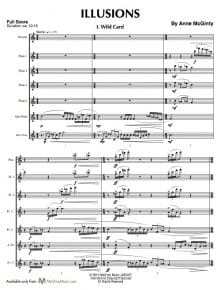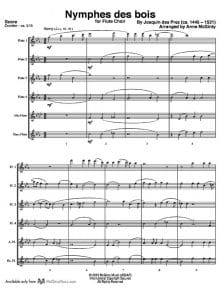Search Music
Music Categories
PDF Download Only
Purchase. Print. Play.
-
Haec Dies – Flute Choir
This joyous 6-part motet is a welcome addition to the flute choir repertoire. In polyphonic and imitative style, each voice is important to the overall structure. A student of Thomas Tallis, William Byrd was the leading English composer of his time, a great master of the Renaissance along with Giovanni Palestrina and Orlando de Lassus, and left a huge legacy of printed music. The lyrics are: “This is the day the Lord has made; let us rejoice and be glad in it. Alleluia.” Each time the word rejoice appears, the melody ascends, giving added brightness and lift. The common pronunciation of “Haec” is “eck” although it may also be pronounced as “hike.” Haec dies means this is the day.
Composer: Anne McGinty
Instrumentation: 5 C Flutes & Alto Flute
Duration/# of Pages: ca. 2:15 / 13 pages, 8.5″ x 11″
Key: N/A -
I Love, Alas – Flute Choir
George Kirbye (c. 1565 – 1634) was an English composer of the late Tudor period and early Jacobean era. He was one of the members of the English Madrigal School, but also composed sacred music.
Little is known of the details of his life. He probably made the acquaintance of John Wilbye, a much more famous madrigalist, who lived and worked only a few miles away, and whose style he sometimes approaches.
Kirbye's most significant musical contributions were the psalm settings he wrote for East's psalter in 1592, the madrigals he wrote for the Triumphs of Oriana (1601), the famous collection dedicated to Elizabeth I, and an independent set of madrigals published in 1597. This piece, one of six madrigals for six voices, shows careful attention to the text setting.
The lyrics are:
I love, alas, yet am I not beloved;
My suits are all rejected,
And all my looks suspected.
Experience now too late hath proved,
That 'twas in vain that erst I loved.
This madrigal is written in an imitative style and as the different voices enter, the accompanying voices should get somewhat softer so all entrances can be easily heard. This is notated using dynamics and decrescendos at the beginning of the piece; however, the concept applies to all imitative entrances. The ranges are not extreme and this would be a good choice for young players as well as the experienced flute choir.
There is no recording available at this time.
Composer: Anne McGinty
Instrumentation: 5 C Flutes & Alto Flute
Duration/# of Pages: ca. 2:00 / 15 pages, 8.5″ x 11″
Key: N/A -
Illusions – Flute Choir
Illusions make us think we are seeing something we’re not, a deception, which is quite magical; and this piece is based on magic.
The first movement, Wild Card, depicts the journey to find one’s own way in life. The individual parts go this way and that, sometimes at peace with decisions made and sometimes filled with the unease that comes with fear of the unknown.
A wizard can be someone clever and skilled, as a computer wizard, and can also be synonymous for obsessions, including bewitchment and enchantment. Wizardz, the second movement, gives every instrument its own voice within the ensemble, sometimes clever and skilled, sometimes filled with enchantment and motivation with a little sorcery for good measure. Juggling, the third movement, sonically juggles the sound back and forth, up and down among the players, trying to keep all the balls in the air at the same time.
The sample score shows the first page of each of the three movements. At this time there is no recording available.
Composer: Anne McGinty
Instrumentation: Piccolo, 4 C Flutes, Alto Flute & Bass Flute
Duration/# of Pages: ca. 10:15 / 74 pages, 8.5″ x 11″
Key: N/A -
Nymphes des Bois (Josquin) – Flute Choir
Nymphes des bois, also known as La Déploration de Johannes Ockeghem, is a lament by Josquin des Prez (ca. 1445 – 1521) on the death of his predecessor, Ockeghem. Josquin was one of the most influential Renaissance composers and was considered a great master of his time.
The music is based on a poem (elegy) by Jean Molinet, a French poet and composer. The descending thirds in the chorus represent the names of the composers of that time: Josquin, Pierson, Brumel and Compére.
The lyrics to the chorus are:
Put on the clothes of mourning.
Josquin, Pierson, Brumel, Compére.
And weep great tears from your eyes,
For you have lost your good father.
May they rest in peace.Amen
Composer: Anne McGinty
Instrumentation: 4 C Flutes, Alto Flute & Bass Flute
Duration/# of Pages: ca. 3:15 / 11 pages, 8.5″ x 11″
Key: N/A




